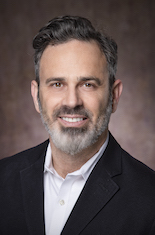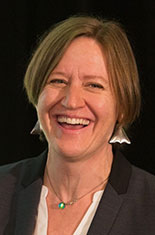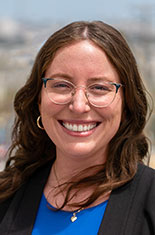
The Joint Office of Energy and Transportation (Joint Office) team has deep expertise in zero-emission transportation infrastructure. The Joint Office team also helps coordinate and leverage expertise between the U.S. Department of Energy and the U.S. Department of Transportation to further progress on zero-emission transportation infrastructure. The following people are key contacts for the Joint Office.
To request technical assistance or ask a general question, contact us.

Gabe Klein is the executive director of the Joint Office of Energy and Transportation. Previously, he served as the commissioner of the Chicago Department of Transportation and director of the Washington, D.C., District Department of Transportation, where he revamped technology platforms and government processes while focusing on putting people (versus cars) first on city streets. This included launching two of the first and largest solar-powered bikeshare systems in the country and building protected bike lanes and better pedestrian infrastructure for vulnerable citizens citywide, as well as facilitating private services like carshares and rideshares to support city mobility goals.
He honed his creativity and leadership skills working in business as vice president at Zipcar and national director of stores at Bikes USA. He also co-founded CityFi, a consulting firm to help city leaders, chief executive officers, and others understand the complexities of 21st century challenges, facilitate people-centric solutions, and use new models and technology-based tools to deliver optimized results. Clients ranged from foreign governments to cities, states, start-ups, and publicly traded companies.
In 2015, he published Start-Up City: Inspiring Private and Public Entrepreneurship, Getting Projects Done, and Having Fun. The book focuses on revamping how we innovate in cities and rethinking public-private partnerships as technology shapes a dramatically different future. He received a bachelor’s degree in marketing management from Virginia Tech’s Pamplin College of Business and an executive certificate in transportation/mobility management from The Wharton School. He also served on the 2020 Biden-Harris Agency Review Team for the U.S. Department of Transportation with a focus on innovation, including transportation electrification and program delivery.

Dr. Rachael Nealer is the deputy director for the Joint Office of Energy and Transportation. She also chairs the Transportation Research Board’s Alternative Fuels and Technologies Committee. Throughout her career, she has focused on researching transportation as a system of systems and developing strategies around how to decarbonize transportation through technology development in concert with supporting policies.
Previously, she held various positions, including deputy director of transportation technology and policy for the White House Council on Environmental Quality and senior advisor and chief of staff for the U.S. Department of Energy’s Bioenergy, Hydrogen and Fuel Cell, and Vehicle Technologies Offices. She has also worked in the nonprofit sector, at the Union of Concerned Scientists, researching the lifetime environmental impacts of electric vehicles compared to gasoline vehicles. Before that, she worked at the U.S. Environmental Protection Agency’s Renewable Fuels Standard Office.
She received her joint doctorate in civil and environmental engineering and engineering and public policy from Carnegie Mellon University, where she specialized in the lifecycle environmental impacts of transportation.

Chief Technology Officer
Alex Schroeder is the chief technology officer for the Joint Office of Energy and Transportation. When the Joint Office was originally launched, he served as the interim executive director, aligning resources and expertise across the U.S. Department of Transportation (DOT) and the U.S. Department of Energy (DOE).
He is on assignment from the National Renewable Energy Laboratory (NREL), where he leads a research group that focuses on electric vehicle charging, grid integration, and commercial vehicle decarbonization. He has served in a variety of leadership roles at NREL, ranging from transportation technology deployment to institutional planning and strategy. During that time, he helped conceptualize DOE’s Energy Efficient Mobility Systems Program and aligned efforts between DOE and DOT to accelerate transportation systems research. He also served as a senior advisor on innovation to DOT and was part of the team that supported the initial designation of alternative fuel corridors.
Prior to NREL, he spent nearly a decade in state government in the Colorado Governor’s Energy Office and Western Governors’ Association, where he led programs related to transportation fuels and clean energy. An engineer and pilot by training, he has spent his career supporting research, policies, and programs that push past traditional boundaries in pursuit of outcomes that transcend organizations and magnify benefits. He holds a master’s degree in engineering and technology management from the Colorado School of Mines and a bachelor’s degree in engineering from the University of Illinois at Urbana-Champaign.

Jonathan Willingham is the chief of staff for the Joint Office of Energy and Transportation. His career has focused on strategic planning, operational leadership, and political management. Serving as chief of staff to Mary Cheh for 14 years, he acted as Chair of the Committee on Transportation and the Environment at the Council of the District of Columbia, overseeing the operations of both her personal and committee offices.
In addition to a heavy focus on economic policy, he worked on issues related to electric vehicles, autonomous vehicles, personal delivery devices, transportation network companies, and public-private partnerships for infrastructure. The committee advanced some of the most progressive multimodal and environmentally conscious transportation legislation in the country, including measures that expanded public electric vehicle (EV) charging and required make-ready EV charging infrastructure in all new buildings in the District of Columbia.
Before working in government, Willingham was a litigation attorney serving as law clerk to the Hon. Geoffrey M. Alprin of the District of Columbia Superior Court. He received his legal degree from the George Washington University Law school, where he taught legal writing and rhetoric as a visiting associate professor and professorial lecturer in law. He also served for ten years on the board of the GW Law Alumni Association, two years as president, and participated in two decanal searches. His bachelor's degree is from Wake Forest University, where he has served on several boards, including his current role on the Alumni Council.

Technical Assistance Program Manager
Linda Bailey is the program manager for technical assistance within the Joint Office of Energy and Transportation. Linda leads efforts to help states, cities, counties, and tribes succeed as the United States expands infrastructure for a low-carbon transportation future.
Prior to this position, Linda served as the Vision Zero director for the District of Columbia Department of Transportation (DDOT). She led efforts to accelerate and innovate traffic safety improvements throughout the District. Before that, she served as the executive director of the National Association of City Transportation Officials (NACTO), where she worked on policy initiatives to support more sustainable city transportation at the national level, including everything from regulatory support for multimodal street design to automated vehicles.
During her tenure as executive director and previously as an adviser, NACTO published three new national design guides for bicycle facilities, urban streets, and transit-first streets. These publications enabled cities to hone best practices for building city streets that further each community’s vision for its future. Previously, she worked for the City of New York on projects including climate policy, vision zero, expressway removal, advocacy for better federal support of city transportation projects, and collaboration with the State of New York on federally funded projects.
Overall, Linda has over twenty years of experience working on sustainable transportation policies with work that has spanned research, advocacy, and implementation. Her publications include The Broader Connection between Public Transportation, Energy Conservation and Greenhouse Gas Reduction, Aging Americans: Stranded without Options, and Improving Metropolitan Decision Making in Transportation: Greater Funding and Devolution for Greater Accountability. She also contributed to the NACTO Urban Street Design Guide, the NACTO Urban Bikeway Design Guide, Mean Streets, Measuring the Health Effects of Sprawl, Clearing the Air; and Driven to Spend.
Ms. Bailey has a master’s degree in urban planning from the University of Michigan.

Standards and Reliability Program Manager
Sarah Hipel is the standards and reliability program manager within the Joint Office of Energy and Transportation. The Standards and Reliability program covers reliability metrics, charging protocols and standards, cyber security standards and guidance to the states, standard practices, data collection and sharing, and new tools for collaboration and product development.
Sarah is an experienced engineer with a passion for e-mobility and a specialization in interoperable mobility infrastructure. With years of experience in the battery electric vehicle field, she has strong technical proficiency in high voltage charging, electric vehicle supply equipment development, commercial vehicle design, and advanced charging control strategies.
Sarah is known for her skills in mobility industry expertise, program planning and development, establishing and implementing planning and control systems, performance management and evaluation, resource allocation and management, and technical system design. She is also proficient in various protocols, including OCPI, OCPP, OpenADR2.0b, J1772, CCS, DIN, ISO15118-2, ISO15118-20, SEP2, CAN, and MODBUS. Sarah is an expert in regression, acceptance, unit, contract, and interoperability testing.
Sarah has a B.S. in analytic philosophy from Eastern Michigan University.

Senior Advisor for Finance
Scott Kubly is the senior advisor for finance for the Joint Office of Energy and Transportation. Scott works on innovation in finance, contracting, government processes, and interagency coordination, including electric vehicle charging business models and opportunities to improve contracting processes.
Previously, he founded Cabana, a tech-enabled campervan rental experience. At Cabana, he turned a napkin sketch into a product, team, and company that changed customers’ lives. His work to promote van travel at Cabana earned him the ASTA Entrepreneur of the Year award. Prior to founding Cabana, he led Lime’s government relations team.
Scott spent the first two-thirds of his career in the public sector working in departments of transportation in Washington, D.C., Chicago, and Seattle. As Director of the Seattle Department of Transportation, he developed an internationally adopted regulatory framework for micromobility, reduced serious and fatal crashes by 20%, and reduced single occupant auto commuting by 10% over 3.5 years.
Scott began his career as a Senior Advisor at Alta Bicycle Share and received an MBA from The Wharton School, MSCRP in Community and Regional Planning from The University of Texas at Austin, and a BA in Geography from the University of Missouri-Columbia.

Communications and Stakeholder Engagement Program Manager
Steve Lommele is the communications and stakeholder engagement program manager. In this role, he leads communications and stakeholder engagement, supports technical assistance and capacity building, and collaborates with internal and external partners on workforce development priorities.
Steve joined the Joint Office as program manager in 2024, but previously supported the Joint Office from 2022-2024 as interim communications and stakeholder engagement lead through a detail assignment from the National Renewable Energy Laboratory.
He joined NREL in 2008 and is a project leader in the Center for Integrated Mobility Sciences. Previously, he led collaborative efforts with end-users of NREL and U.S. Department of Energy transportation and mobility research to deploy innovative solutions for advanced transportation projects, encompassing alternative fuels, mobility systems, electric vehicles, fleet operation, and transportation efficiency. He also worked with Clean Cities coalitions and other industry stakeholders on efforts related to the energy impacts of evolving transportation technologies, managed the Alternative Fueling Station Locator, and coordinated standards development for electric vehicle supply equipment data sharing.
Before joining NREL, he worked as an outreach and education field programs manager for the International Mountain Bicycling Association, where he traveled the country and worked with advocates and land managers in 43 states. He also spent six years working in public relations, supporting clients in the technology industry. He holds a master’s degree in environmental policy and management from the University of Denver and a bachelor’s in business administration from the University of Colorado at Boulder.

Senior Advisor, Business Models
Kevin Miller is the senior advisor for business models within the Joint Office of Energy and Transportation. Kevin leads efforts to develop policies and programs to unleash significant and sustainable private investment in zero-emission vehicles and infrastructure and serves as subject matter expert for clean transportation business models. Previously, Kevin served as senior director of public policy for ChargePoint, a leading provider of EV charging solutions, and acting chief financial officer for the Massachusetts Executive Office of Energy and Environmental Affairs.

Performance and Metric Manager
Lissa Myers is on detail to the Joint Office of Energy and Transportation from the National Renewable Energy Laboratory (NREL). She leads the development and deployment of an evaluation program for the Joint Office, as identified in the Bipartisan Infrastructure Law.
She joined NREL in 2009, leading efforts to architect and implement sustainability- and transportation-related programs to optimize operations for the NREL campus. She also developed and managed a replicable process for data collection, management, and analysis to support climate adaptation and resilience, and led transportation infrastructure planning and related decision-making at NREL and other federal sites. She also has experience deploying electric vehicle charging infrastructure and integrating smart-charge management practices with energy management systems in support of federal sustainability requirements and decarbonization efforts.
Before joining NREL, she worked in the private and nonprofit sectors as a transportation planner advocating for, designing, and implementing alternative modes of transportation at the regional and state levels. She also has expertise managing large, multidisciplinary project teams to deliver innovative solutions in complex, high-visibility projects. She holds a master’s degree in public policy from the University of Denver and a bachelor’s degree in environmental design, with an emphasis in urban planning, from the University of Colorado at Boulder.

Deployment Manager – States and Corridor Electrification Technical Assistance
Mike Scarpino is supporting the Joint Office of Energy and Transportation (Joint Office) from the U.S. Department of Transportation (DOT) Volpe National Transportation Systems Center (Volpe). In this role, he leads the technical support provided to states as they implement the Biden-Harris administration goal of building a national network of electric vehicle chargers through the implementation of the National Electric Vehicle Infrastructure Formula Program.
In addition to supporting the Joint Office, his portfolio of work at Volpe includes providing technical and programmatic support for the Federal Highway Administration (FHWA) and the U.S. Department of Energy (DOE) for various transportation electrification and alternative fuel initiatives and activities. These include the FHWA Alternative Fuel Corridor Designation Initiative and the DOE Vehicle Technologies Office Technology Integration and Clean Cities Coalition Network programs.
Before joining DOT, he worked at DOE’s Northeast Regional Office and the National Energy Technology Laboratory as a regional project manager and team leader supporting the Clean Cities Coalition Network. For 25 years at both DOT and DOE, Mike has worked on public-private partnerships and projects that provide federal support for the alternative fuels industry market transformation efforts related to vehicle deployment, as well as charging and fueling infrastructure development.
His federal career of more than 35 years includes working as a nuclear engineer for the U.S. Department of the Navy’s Portsmouth Naval Shipyard in New Hampshire and DOE’s Savannah River Site in South Carolina. Mike has a bachelor’s in mechanical engineering from the University of Maine.

Senior Advisor, Community and Urban Charging
Debs Schrimmer is the senior advisor for community and urban charging. Previously, she was a director at Lyft, where she oversaw policy research and development for the company’s micromobility division, partnered with cities on innovative street design and curb management strategies, and established the first rideshare partnerships with transit agencies in the country. Prior to Lyft, she worked as a digital policy strategist at Code for America and as a transportation planner at the Sacramento Area Council of Governments.
Debs received her B.S. from the University of California, Davis, is an honoree of the Women’s Transportation Seminar, and has served on the Board of the California Transportation Foundation.

Senior Advisor, Electric Utility Programs and Policies
Sejal Shah is the senior advisor for electric utility programs and policies. Previously, she served as a program manager at National Grid, where she collaborated to develop electric transmission and distribution project proposals and submit applications for federal funding opportunities.
Prior to National Grid, Sejal oversaw two large residential and fleet electric vehicle (EV) programs. She also worked as an environmental analyst at the Massachusetts Department of Environmental Protection’s Bureau of Air Quality. She proudly served as program manager for two first-of-their-kind programs in Massachusetts: Massachusetts Department of Environmental Protection’s Massachusetts Electric Vehicle Incentive Program (MassEVIP) and National Grid’s residential Massachusetts EV Off-Peak Charging Program.
Sejal received her master’s degree in environmental science and policy from Clark University in Worcester, Massachusetts.

Interim Program Manager, Data and Analysis
Eric Wood is leading the Joint Office’s data and analysis team. His team is focused on improving the EV charging experience by collecting performance data from federally funded charging stations through EV-ChART, making real-time data on charging station availability and pricing directly accessible to the public, and deploying state-of-the-art infrastructure planning tools through the U.S. system of national laboratories.
Eric is on a detail assignment at the Joint Office from the National Renewable Energy Laboratory (NREL) where he leads a team of engineers conducting EV charging infrastructure research on the topics of network planning and grid integration. Eric holds mechanical engineering degrees from the University of Nebraska at Lincoln and Colorado State University. He is motivated by working with diverse stakeholders at the intersection of the automotive, transportation, and power sectors.